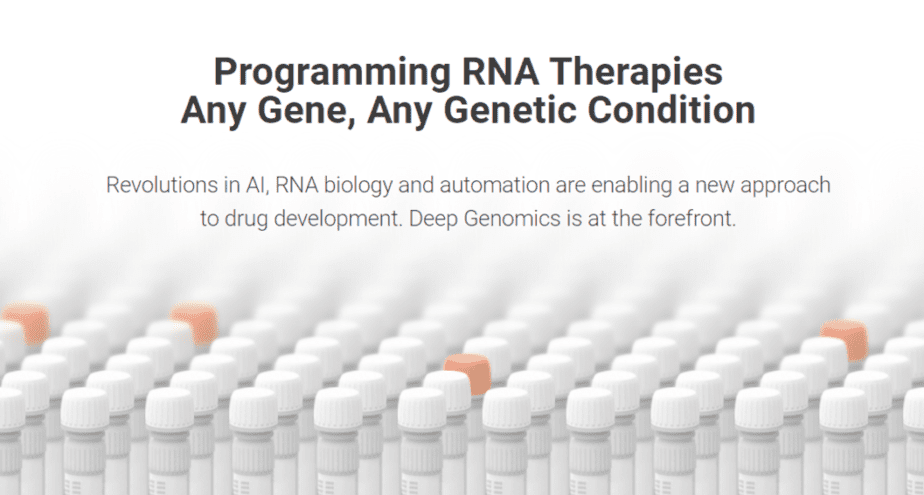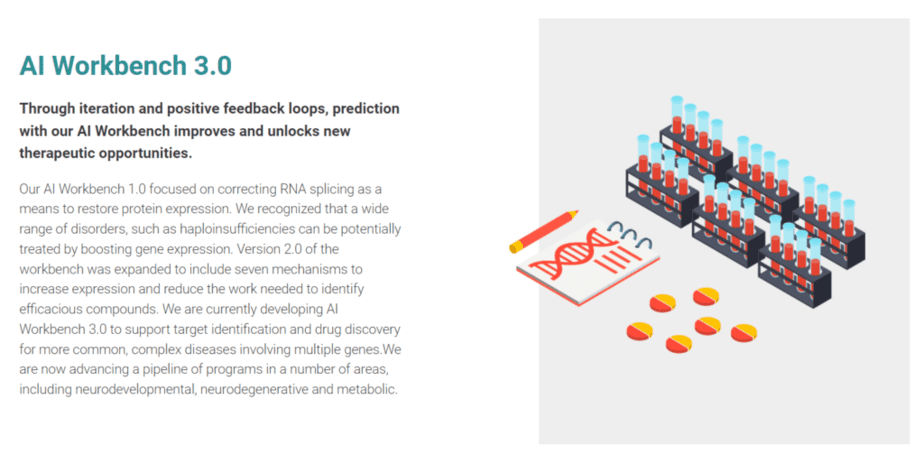Table of contents
Deep Genomics is a biotechnology company dedicated to developing drugs and therapies for rare and complex ailments and diseases that do not have a cure at present. The company is one of the major drug development centers that depend on human genomics in finding lasting cures for severe ailments. A unique feature of Deep Genomics is that it uses a combination of artificial intelligence, RNA biology, and automation in pushing for drug development. Learn more in our Deep Genomics review!
The company believes that the future of medicine will rely on artificial intelligence, because biology is too complex for humans to understand.
Deep Genomics Introduction
Deep Genomic was founded by Brendan Frey, Andrew Delong, and Hui Yuan Xiong to carry out drug development by exploiting the possibilities that machine learning and artificial intelligence offer. It was established in 2014 in Toronto, Ontario, Canada, which doubles as its headquarters. Deep Genomics has offices in Toronto and Boston and seeks to offer its products to patients globally. The Boston office houses the clinical development and business development teams.

Brendan John Frey is an engineer and scientist and is CEO of Deep Genomic. Since its establishment, he has led the firm and has overseen the development achieved over the years.
Review of Deep Genomics Objective and Science
The objective of Deep Genomics is to develop genetic-based therapies and treatments for diseases that do not currently have cures. It builds artificial intelligence-driven platforms that guide the creation of new medical therapies by blending synthetic biology, artificial intelligence, and genomic medicine.
Specifically, it uses its proprietary AI Workbench to correct the effects of DNA and RNA. For each genetic disease, the company seeks to identify and disrupt molecular phenotypes, such as transcription, splicing, translation and protein binding that contribute to disease.
Deep Genomics acts as a database of drug candidates and molecular compounds. It collects information on every compound identified and feeds it back to the AI system data set. Using this system, it hopes to find drugs more efficiently than individual testing.
Deep Genomics believes in the development of deep learning and artificial intelligence methods, such that they can be used in accurately determining the consequences of genetic mutations and in designing medications that can slow, stop or reverse the progression of the disease. This is an example of precision medicine.
There have been three versions of the AI Workbench:
- Version 1.0: A focus on molecular phenotypes, such as transcription, splicing, translation and protein binding
- Version 2.0: Expanded to include seven mechanisms to increase expression and reduce the work needed to identify efficacious compounds
- Version 3.0 (in development): Identifies novel targets and supports drug discovery for more common, complex diseases involving multiple genes

Review of Deep Genomics Services and Products
While Deep Genomics aims to develop therapies for all kinds of diseases, they only currently offer research on central nervous system (CNS) disease and metabolic diseases. The firm has invested a lot of technology and science into developing these products and has stated that cures could be successfully provided in the future.
Review of Deep Genomics focus on the central nervous system
The company aims to offer a cure for the following CNS conditions:
Frontotemporal Dementia (FTD)
FTD is not a common type of dementia, but it tends to affect people aged 45 to 65, which means it affects younger people. Health professionals believe that frontotemporal dementia is genetic, as 4 to 10 people struggling with the disease have a relative who also had it. Frontotemporal dementia is the type of dementia that affects a person when the temporal and frontal lobe of the brain is damaged.
The disease damages the part of the brain that controls judgment, decision-making, and social skills, causing the person affected to have problems with their daily activities in their life. The symptoms of frontotemporal dementia depend on the part of the brain where the damage starts. For example, if it affects the part of the brain that controls your connection with objects, you might not recognize dangerous objects.
The symptoms of frontotemporal dementia include slow speaking, incorrect use of words, unsympathetic behavior, and difficulties in organizing and planning. Memory issues from the disease affect the patient when the disease progresses.
Niemann-Pick Disease
Deep Genomics furthers it’s dedication to rare disease by focusing on Niemann-Pick disease type C. This disorder is an uncommon genetic condition that affects the central nervous system and the body’s organs. The disease causes a chronic neurodegenerative or an antenatal disorder. Because it is a rare condition, patients may not get adequate care due to delayed diagnosis and scarcity of expertise. This disease is fatal as most of the children affected die before they turn 20.
Niemann-Pick disease type C is a lysosomal storage disorder where a genetic variant disrupts the normal activity of cells’ lysosomes and leads to the lysosomes accumulating multiple tissues that affect proper functioning. This disease can affect babies who are over three months old, and the neurological symptoms would help determine the severity of the disease and the child’s life expectancy.
The disease is inherited through the genes, causing a mutation in the gene that results in the cells malfunctioning as it contains accumulated fat molecules. With time the symptoms of this disease become more evident as the disease is progressive.
The symptoms of this condition include abnormal movement of the eye, chronic liver disease, speech difficulty, difficulty with feeding or swallowing, and an enlarged spleen and liver.
The review of Deep Genomics continues with more CNS focused disorders:
Pediatric Epilepsy
Pediatric epilepsy is a neurological condition that causes a child to experience recurrent seizures. In America, about 450,000 children under the age of 17 have epilepsy. Some children might outgrow the seizures when they become teenagers, while others do not. Pediatric epilepsy is a neurological disorder where there is a disruption of the nerve signals in the brain, which results in seizures.

A child has a 2-5% chance to have this disease if a relative also has the disease. The following are some of the symptoms of a seizure in children. Loss of consciousness, breathing issues, loss of bladder or bowel control, a confused appearance, staring, suddenly falling for no reason, and jerking of the legs and arms.
Parkinson disease
Parkinson’s disease is a common neurological disorder that affects seniors over 60 years old. Parkinson’s disease is more likely to affect people who have a family member who has the disease. Parkinson’s disease is a neurological disorder that affects the body’s movement.
Dopamine is a substance in the brain that enables a coordinated movement of the muscles in the body, and substantia nigra is the part of the brain that produces dopamine. The cells of the substantia nigra in people with Parkinson’s start dying gradually, which reduces the dopamine levels. When the dopamine level drops to 60 or 80%, it triggers the symptoms of Parkinson’s to start appearing. The following are some of the early symptoms of the disease. A reduction in a person’s ability to smell, changes in the voice, constipation, stooped posture, and cramped handwriting.
Review of Deep Genomics focus on metabolic diseases
Deep Genomics is also currently working on developing cures for these diseases:
Wilson Disease
Wilson disease is an uncommon condition where copper is accumulated in the body’s organs such as the eyes, brain, and liver. The disease usually affects people with family members who have the disease. Worldwide, the disease affects one in 30,000 people. The accumulation of copper causes copper poisoning to the body’s organs.
Usually, the liver helps remove excess copper from a healthy body released through the urine. The liver of people with Wilson disease cannot properly filter out the extra copper in the body, which causes it to build up. The following are some of the symptoms of copper accommodation in the brain: memory vision or speech impairment, walking abnormally, insomnia, migraines, depression, and drooling.
The symptoms of the condition include nausea, weakness of the body, weight loss, itching, muscle cramps, and jaundice. The following symptoms show that copper is accumulated in other body organs. Other symptoms are kidney stones, arthritis, low blood pressure, discoloration of the nails, and irregularities in menstrual flow.
Refractory Gout
Refractory gout is an uncommon condition where uric acid becomes too much in the body. A person who has a relative who has the disease is more likely to have the disease as it is genetic. Refractory gout is a disorder where uric acid, which is a waste product, accumulates in the body. Uric acid is normally processed by the kidneys and dissolves in the blood before leaving the body through urination in a healthy person.

The intestine also helps to excrete a small amount of uric acid from the body. A person with this disease has an excess of uric acid in their body because the body is producing too much uric acid, or the kidney cannot remove so much uric acid from the body. The symptoms of refractory gout include swollen joint, pain around the joints, chronic arthritis, redness of the joint, nodules, or lumps on the elbows, hands, or fingers.
Nebula Genomics
Deep Genomics has continued to focus on developing drugs and therapies to help find cures for serious diseases and conditions.
While Deep Genomics is a strong company in drug development using human genetics, it is not a genetic testing company. It does not offer commercial tests or diagnosis to determine whether a patient is genetically predisposed to any condition. It also doesn’t offer genetic counseling in that respect. Hence, patients cannot test or get expert knowledge on their condition as to whether they are genetic and the genes responsible for such.
If a user seeks to perform genetic testing, they have many commercial genetic testing sites to choose from. Nebula Genomics is a major testing company that performs 30x Whole-Genome Sequencing that provides patients with 100% of their genetic information. Using this information, customers can get the most comprehensive view of their genome and all their DNA says about them. With weekly updated reports, customers can learn more about themselves as more scientific data becomes available.
Below are the complimenting offers of the Deep Genomics review and Nebula Genomics.
| Deep Genomics | Nebula Genomics | |
| DNA testing method | None | Sequencing all 20,000 genes and regulatory regions |
| Ancestry reporting | None | Perform deep ancestry reporting with the complete Y chromosome and mtDNA sequencing |
| Purpose | Drug and therapy development for incurable diseases using Artificial Intelligence. | Offer genetic testing to provide patients with the specified results on everything related to genetics |
| Data access | Patients can access data on request | Patients can access data on request |
| Reports | No | No, but data is of the highest quality and can be used by physicians and genetic counselors |
| Cost | Not listed | $0, $99, $299 |
Did you like our Deep Genomics review? You can read more reviews on our blog and check out our complete guide to the best DNA test kit and other home tests.
More biotechnology companies focused on various disease areas are:
- Verge Genomics (neurogenerative disorders)
- Verily Life Sciences (general research, care, and innovation)
In addition to Nebula Genomics, you may also be interested in genetic testing companies that cover rare diseases:
- GeneDx (clinical testing for rare diseases)
- CENTOGENE (rare disease and other conditions)
- Stripe2be (rare diseases)
December 21, 2021
